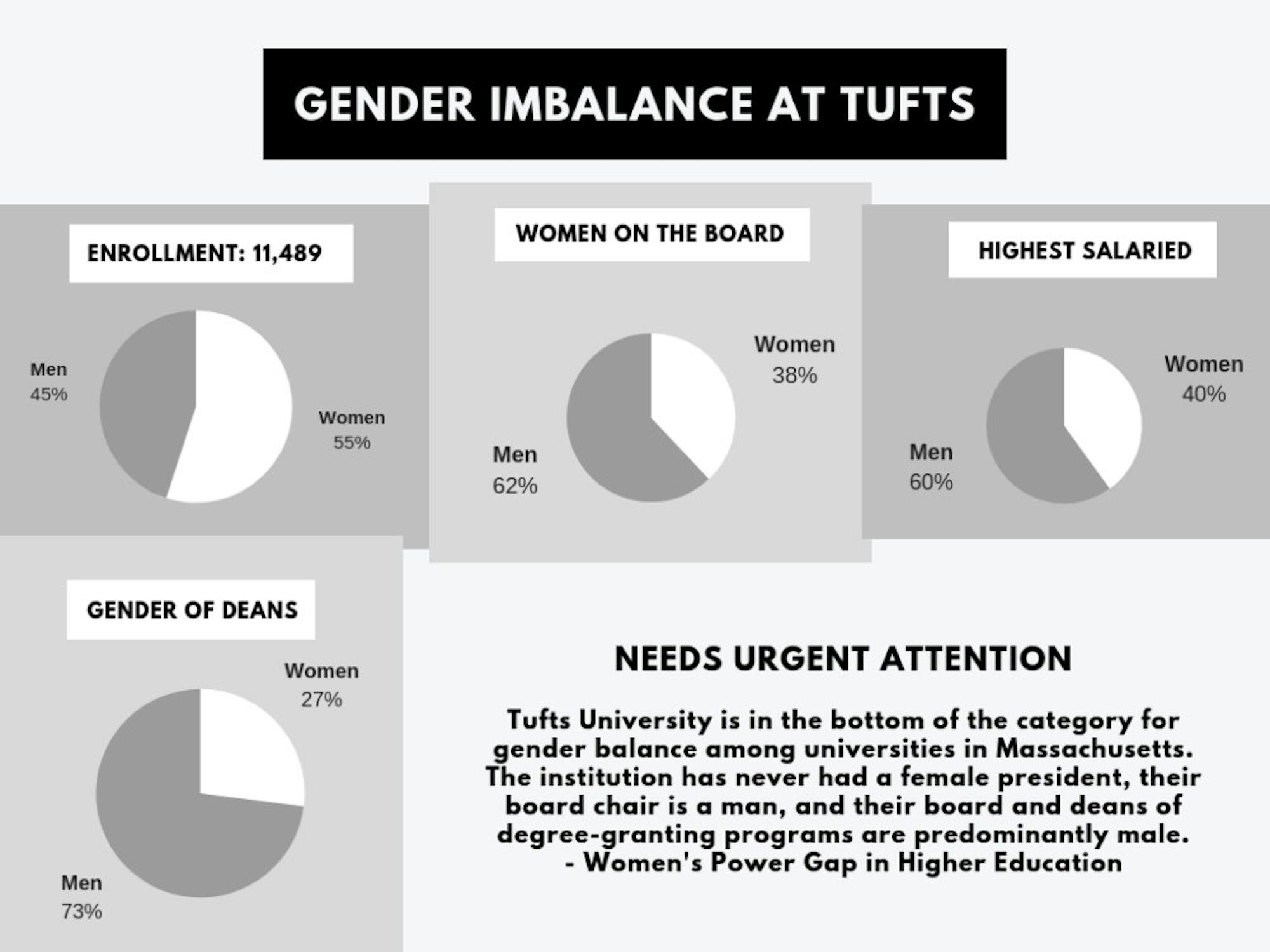Tufts ranks near the bottom of gender parity among Massachusetts colleges, according to a new study released by the nonprofit Eos Foundation on Sept. 27.
The report, developed in partnership with the University of Massachusetts Boston’s Center for Women in Politics and Public Policy at the John W. McCormack Graduate School of Policy and Global Studies, surveyed the prominence of female leadership across 93 Massachusetts-based colleges. It ranked Tufts as 87th overall.
"[Tufts] has never had a female president, their board chair is a man, and their board and deans of degree-granting programs are predominantly male," the report read. It placed Tufts in the "Needs urgent attention" category — the lowest categorization used. There are 19 schools under this category, including the Massachusetts Institute of Technology, Boston College and Boston University, according to the report.
Andrea Silbert, president of the Eos Foundation, said that the results startled even the commissioners of the report.
“We were very surprised how low Tufts was ranked, due to its image as a very progressive institution," Silbert said.
Silbert said Tufts ranked low due to lack of women in leadership positions.
"I think it's just a lack of intentionality," she said. "Tufts has women, but they’re just at lower levels."
She also said that complete parity means more than securing a critical mass in influential positions, which she defined as 30 percent of women in such positions.
“People think that 30 percent [male-female share of positions] is good until they’re pushed. We need to push in all sectors for parity. Parity is our new benchmark," Silbert said. “Lots of colleges think they’re good because they have some women in high positions, but they don’t have parity."
Tufts' ranking also surprised Judy Neufeld (LA '05), a Tufts alumna and consultant who works for the Women's Power Gap Initiative.
“As a Tufts alum, I was horrified how close to the bottom Tufts ranked," Neufeld said. "I never looked at Tufts leadership as a student, but looking through a new lens, I think we can do so much better.”
Neufeld suggested that the university consider the women's power gap in influential positions when it hires new people.
“The most important area for Tufts to improve upon is that Tufts has never had a woman president," Neufeld said. "I also hope that the Tufts board starts to take gender parity seriously as they search for a new provost and new deans.”
Silbert, however, said that a push on the community level is necessary to bring out the change.
“We put the data out there and the tools out there, and we expect people from the Tufts community to run with it. We expect it to be a movement, to get this in front of the president's office and say, 'we have to do better,’" Silbert said.
Neufeld echoed with Silbert's sentiment.
“Students have a lot more power than you think," she said. "We really encourage students to go to the [Women’s Power Gap Initiative] website. Email [University] President [Anthony] Monaco directly from the website. The more students, alums, board members that let the president know that people care, the more likely that change will come."
Patrick Collins, Tufts' executive director of public relations, told the Daily in an email that the university recognizes room for improvement. However, Collins pointed out that the report didn't include other senior positions held by women at the university.
“Tufts University has made diversity in all its forms a top priority, and while the university has made significant strides in many areas, more work clearly needs to be done," Collins said. "Though we were disappointed that the survey did not include other senior positions at Tufts that are held by women, including our senior vice president and general counsel, our provost ad interim, and our vice provost for research, we recognize that we must do better and are committed to doing so.”
Barbara Clarke, former president of Tufts University Alumni Association (TUAA), outlined her disappointment in Tufts administration's response.
“I have reached out personally to a number of Tufts alumni and I’ve been disappointed that very few men have replied,” she said. “As a former president of [TUAA], I worked hard to make the Alumni Council more inclusive. We made some progress but not enough, and some progress was not sustained after my term."
Clarke said she hopes that the upcoming alumni conference will be a platform to talk about the report.
“There is an upcoming conference called [LEAD IT] and I suspect this report will be discussed by many people. I know I will be discussing it with fellow alumni," Clarke said.
Silbert said that she is optimistic Tufts will make an improvement.
“I am hopeful about Tufts," Silbert said. "Tufts has [multiple] open deanships, and the provost position is open. We’ll know in six months what will happen."






